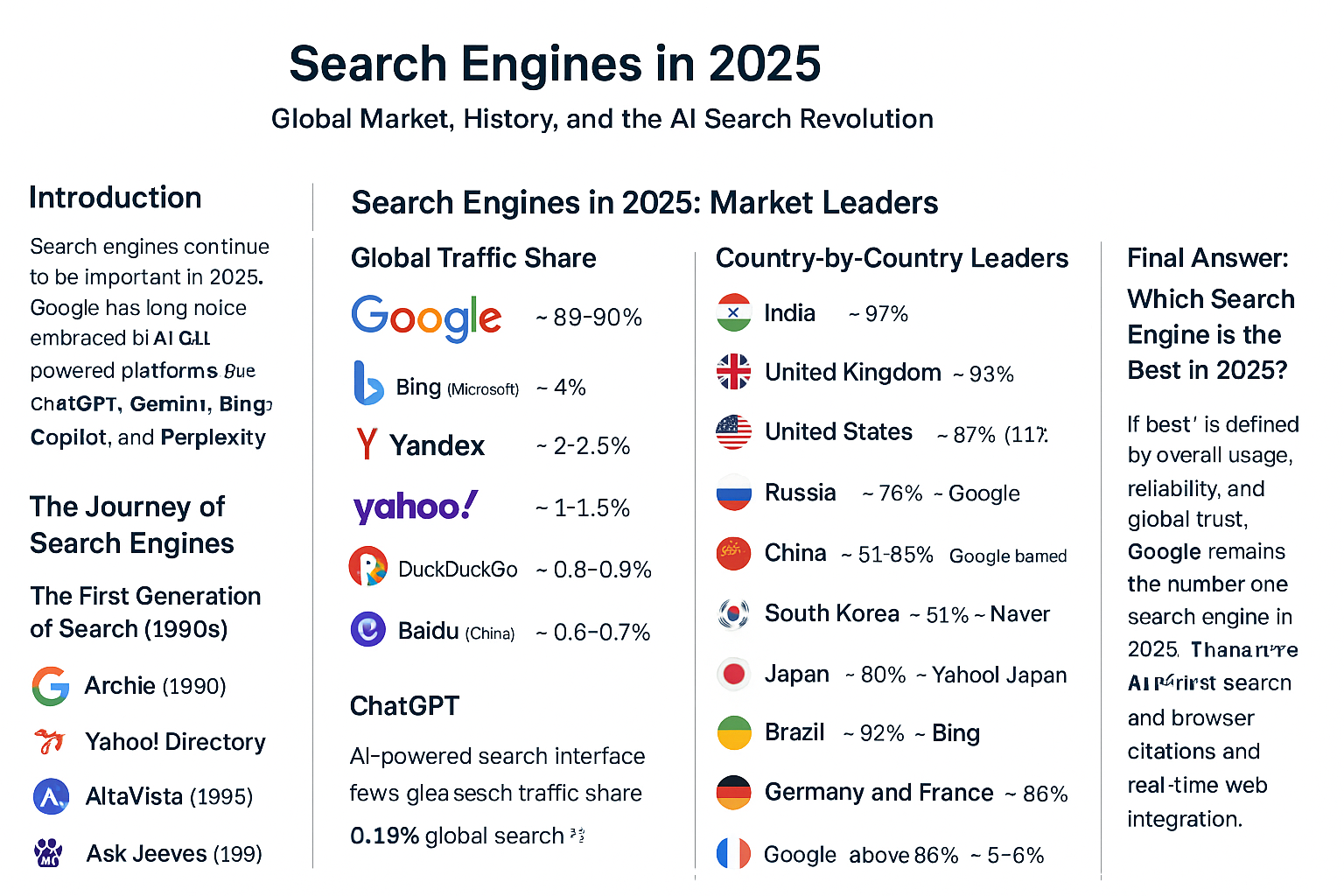Why Search Still Shapes the Internet
The internet is enormous, but the path to information still begins with a search. Whether it’s a student researching, a shopper comparing prices, or a professional solving a problem, search engines remain the front door of the web.
In 2025, that door looks different than it did even five years ago. Google still rules globally, but AI-driven platforms such as ChatGPT, Gemini, Bing Copilot, and Perplexity are emerging as new ways to explore the web. Understanding this evolution means looking at past history, current market share, and future trends.
The Journey of Search Engines
The First Generation of Search (1990s)
The 1990s gave us the foundations:
-
Archie (1990): indexed FTP archives.
-
Yahoo! Directory (1994): manually curated website lists.
-
AltaVista (1995): a powerful crawler-based engine.
-
Ask Jeeves (1996): introduced natural language queries.
These were stepping stones, but they lacked the intelligence to organize the growing web effectively.
Google’s Breakthrough (2000s)
When Google arrived in 1998 with its PageRank algorithm, everything changed. By ranking sites based on backlinks and authority, it delivered cleaner, more relevant results. Within a decade, Google became the world’s dominant search engine.
Other regional players rose too:
-
Baidu (2000) in China.
-
Yandex (1997) in Russia.
Expanding the Landscape (2010s)
The 2010s introduced more alternatives:
-
Bing (2009) by Microsoft, integrated into Windows.
-
DuckDuckGo (2008) for privacy-conscious users.
-
Ecosia (2009), turning search ad revenue into tree planting.
Each addressed a different user intent — privacy, ecosystem impact, or desktop integration.
Search Engines in 2025: Market Leaders
Global Traffic Share
As of 2025:
-
Google controls ~89–90% of global searches.
-
Bing (Microsoft) holds ~4%.
-
Yandex (Russia) sits at ~2–2.5%.
-
Yahoo! keeps ~1–1.5%.
-
DuckDuckGo remains under 1%.
-
Baidu dominates China but is ~0.6–0.7% globally.
Country-by-Country Leaders
-
India: Google ~97%.
-
United Kingdom: Google ~93%.
-
United States: Google ~87%, Bing strong at ~11% (desktop higher).
-
Russia: Yandex leads with ~76%.
-
China: Baidu commands 51–85% (Google banned).
-
South Korea: Google ~51%, Naver ~42%.
-
Japan: Google ~80%, Yahoo! Japan ~9%.
-
Germany & France: Google above ~86%, Bing at ~5–6%.
This regional split shows how cultural and regulatory environments influence user choices.
The AI Revolution in Search
ChatGPT as a Search Engine
ChatGPT, developed by OpenAI, has become more than a chatbot. In 2025, it functions as an AI-powered search interface. Users ask conversational questions and receive direct, contextual answers. While its global share is small (~0.13%), growth is steady, especially among younger users.
Google Gemini (AI Overviews)
Google’s Gemini (formerly Bard) is now embedded into search. Instead of only showing a list of links, Gemini creates AI summaries at the top of results. This keeps users inside Google’s ecosystem but changes how websites get traffic.
Bing with Copilot
Microsoft has rebuilt Bing into a hybrid search + AI assistant. Copilot provides interactive answers, images, and contextual help. This has boosted Bing’s U.S. desktop share to almost 29%, making it the only true challenger to Google.
Perplexity AI
Perplexity represents the AI-first search generation. Its key difference? Transparent citations and real-time web integration. It appeals to professionals who want both AI reasoning and source credibility.
How AI is Changing Search Behavior
From Keywords to Context
In the past, SEO meant targeting keywords. In 2025, AI engines understand entities, relationships, and user intent. For example, searching “best budget phone in Germany” produces not just lists but tailored recommendations considering region, price range, and reviews.
Search Without Clicks
AI summaries reduce the need to click websites. This is called zero-click search. Brands must adapt by ensuring their expertise appears directly in AI answers, not just in organic results.
Multimodal Search
Search is no longer just text. AI integrates:
-
Voice queries via assistants.
-
Image search with tools like Google Lens.
-
Combined voice + image prompts for richer answers.
Future of Search Beyond 2025
Personalization at Scale
By 2030, AI will tailor search not just by keywords, but by:
-
User profile (profession, interests).
-
Behavior patterns (shopping habits, learning style).
-
Real-time context (location, time of day).
Decline of Traditional Results
Google’s list of “blue links” is shrinking. Expect more:
-
Direct AI answers.
-
Interactive cards.
-
Visual, conversational results.
Regional Fragmentation
Global search will remain fragmented:
-
China → Baidu.
-
Russia → Yandex.
-
Korea → Naver.
-
Rest of the world → Google + AI challengers.
Conclusion: Adapting to the New Search World
From Archie in 1990 to AI search in 2025, the journey of search engines reflects how humans demand faster, smarter answers.
In 2025:
-
Google still dominates.
-
Bing, Yandex, and Baidu play strong regional roles.
-
ChatGPT, Gemini, and Perplexity represent the future of AI-driven discovery.
For businesses and content creators, the rule is clear:
-
Don’t just chase keywords.
-
Build depth, authority, and trust.
-
Optimize for AI-first platforms where answers matter more than rankings.
Search is no longer about finding pages — it’s about delivering knowledge instantly.
Key Takeaways
-
Google leads with ~90% global share in 2025.
-
Yandex dominates Russia, Baidu leads in China, Naver strong in Korea.
-
AI search (ChatGPT, Gemini, Perplexity) is growing but still small.
-
SEO now depends on semantic depth and user intent.
-
The future is multimodal, personalized, and AI-first.
